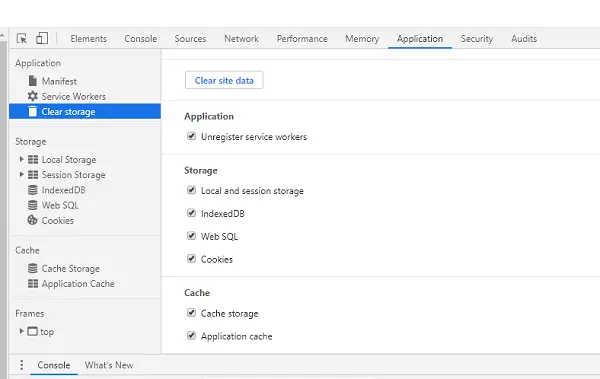Caching is typical behavior of any browser. Whenever you visit a website, it downloads the file and keeps it. So next time you visit the same site, it doesn’t download those files again. Technically, every site can suggest the browser when to download those files back. So if there is a change in the website, your browser will not notice the changes. In this post, we will learn how to refresh and hard refresh your web page in the browser to see the changes.

Refresh and Hard Refresh web page in a browser

We will cover the following topics:
- Simple Refresh
- Hard Refresh
- Server Cache
- Force Clear Browser Cache
1] Simple Refresh in Browser
When you press the F5 key on your keyboard when the browser is open, it sends a request to the brows with an If-Modified-Since header. If the website has set the expiry date for cache high, the browser will load the site from the cache.
2] Hard Refresh in Browser
In the case of a Hard Refresh, the browser does not use anything in the cache and is forced to re-download everything. To carry out a Hard Refresh, press the Ctrl+F5 keys or, while holding down the Ctrl key, click on the Refresh button near the address bar. You can also use Ctrl+Shift and then press R.
It works in Microsoft Edge, Internet Explorer, Chrome and Firefox too.
3] Server Cache
Here is a deal. The server may ignore the no-cache header, and send a server-side cached page. Thus even Ctrl+F5 may return an old version of the page if the server ignores the no-cache header. It is not much you can do about server caching as its a technique used by many websites to speed up. Only when the webmaster decides to clear the server cache, you may see the new version of the website.
4] Force Clear Browser Cache
If the hard refresh doesn’t work, even though you can see a new version of the site in a different browser, then it’s the browser behaving unpredictably. The only way out is to clear the browser cache from browser settings.
In Chrome and Firefox, you can choose to delete cache for a specific website. If you are a Microsoft Edge user, then this browser does not let you delete cache for particular websites. You will have to remove the entire Browsing History & Cache.

You can also use the “Developer Tools” console in Google Chrome to get an Empty Cache & Hard Reload option. To delete cache, you need to choose Applications > Clear Storage > Clear data.
How do I hard refresh my browser?
Hard refresh can fix the loading issues of a web page or website. When you hard refresh a web page or website, your browser bypasses or clears the cache and then loads the website or web page. If you are facing issues while loading websites due to a bad cache or corrupted cache, the hard refresh may fix it. Usually, F5 reloads or refreshes a web page or website in almost all web browsers. To hard refresh, press the Ctrl + F5 keys.
What are refresh and hard refresh?
Simply refreshing a web page or a website does not work if you are experiencing issues with a particular web page or website due to a corrupted cache. The browser loads the website from the cache during the normal refresh. Instead, hard refresh may work because hard refresh bypasses or clears a particular website’s cache and loads it.
TIP: Google Chrome browser includes a feature that lets you Normal Reload, Hard Reload or Empty Cache and Hard Reload a web page. You might want to take a look at this post.
Hope you find this tip useful.
Read next: How to search open tabs in Edge, Chrome, Firefox, Opera browsers.
Leave a Reply